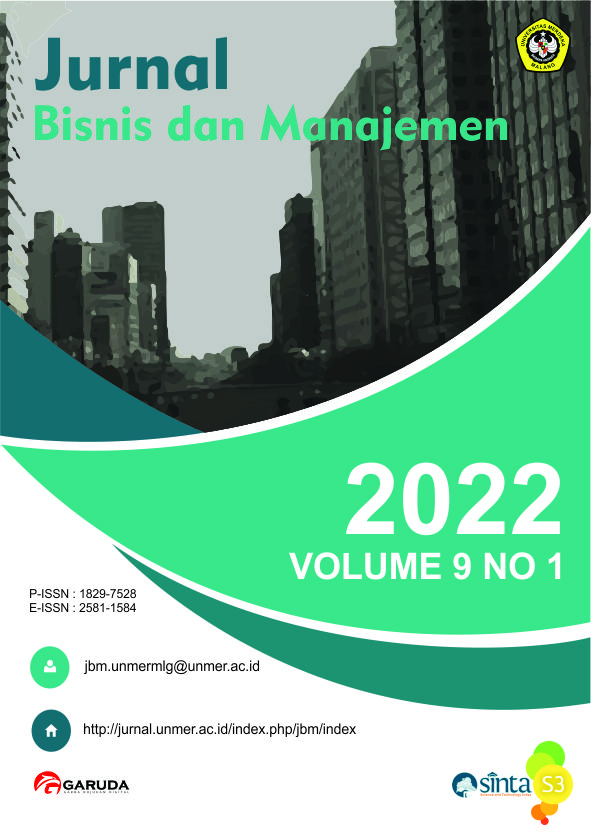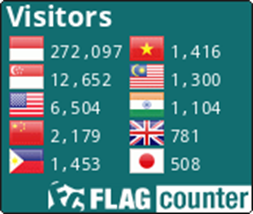Peran Keterlibatan Karyawan, Lingkungan Kerja dan Pembelajaran Organisasi terhadap Komitmen Organsisasi
DOI:
https://doi.org/10.26905/jbm.v9i1.6902Keywords:
Organizational commitment, employee engagement, work environment, organizational learningAbstract
This research aims to find out the effect of employee engagement, work environment, and organizational learning on the organization's commitment to manufacturing companies in The East Jakarta Industrial Park (EJIP) Bekasi Industrial Estate. This research is with a quantitative approach, and this type of research is explanatory research. The study was conducted on 17 manufacturing companies in the EJIP Bekasi industrial area with a population of 2757 employees with a sample of 350 respondents. Data processing uses SPSS and Structural Equation Modeling (SEM) programs with Lisrel software. The results showed that employee involvement in the company has a positive and significant effect on organizational commitment. The work environment has a positive and significant on employee commitment. Organizational learning has a positive and significant on organizational commitment. This research advice, the company engages employees in various tasks will provide an opportunity to optimize its potential and will add a sense of belonging to the company. Improvements in the physical and non-physical work environment, create a calm and conducive work atmosphere to increase organizational commitment. Likewise, the application of organizational learning for employees needs to improve their knowledge, skills, and expertise. Leaders need to support organizational learning for employees. They have a self-development program and increase the organization's commitment.
Downloads
References
Argyris, C. (1999). On Organizational Learning (2nd ed.). Massachusetts: Blackwell Business.
Atak, M., & Erturgut, R. (2010). An empirical analysis on the relation between learning organization and organizational commitment. Procedia - Social and Behavioral Sciences, 2(2), 3472–3476. https://doi.org/10.1016/j.sbspro.2010.03.537
Baker, W. E., & Sinkula, J. M. (1999). The synergistic effect of market orientation and learning orientation on organizational performance. Journal of the Academy of Marketing Science, 27(411), 411–427.
Besharov, D. J., Baehler, K. J., & Klerman, J. A. (2017). Improving Public Services. New York: Oxford University Press.
Colquitt, J. A., LePine, J. A., & Wesson, M. (2017). Organizational Behavior : Improving Performance and Commitment in The Workplace. New York: McGraw-Hill Education.
Creswell, J. W. (2014). Researh Design, Pendekatan Kualitatif, Kuantitatif, dan Mix (Edisi Ketiga). Yokyakarta: Pustaka Belajar.
DuBrin, A. J. (2019). Fundamentals of Organizational Behavior (Sixth Edition). USA: Academic Media Solutions.
George, J. M., & Jones, J. H. (2012). Understanding and Managing Organizational Behavior (Sixth Edition). New York: Pearson.
Ghozali, I. (2013). Aplikasi Analisis Multivariate dengan Program IBM SPSS. Semarang: Universitas Diponigoro.
Hair, J. F., Black, W. C., Babin, B. J., & Anderson, R. E. (2019). Multivariate Data Analysis (8th ed.). New Jersey: Pearson Education.
Hallberg, U. E., Johansson, G., & Schaufeli, W. B. (2007). Type A behavior and work situation: associations with burnout and work engagement. Scandinavian Journal of Work, Environment and Health, 48(25), 135–142. https://doi.org/10.1111/j.1467-9450.2007.00584.x
Hanaysha, J. (2016). Testing the Effects of Employee Engagement, Work Environment, and Organizational Learning on Organizational Commitment. Procedia - Social and Behavioral Sciences, 229, 289–297. https://doi.org/10.1016/j.sbspro.2016.07.139
Handaru, A. W., Rahman, N. F., & Paramita, W. (2021). Pengaruh Job Insecurity Dan Komitmen Organisasi Terhadap Turnover Intention Pada Karyawan Industri Manufaktur (Automotive Dan Metal Part). Jurnal Riset Manajemen Sains Indonesia , 4(12).
Hasyim, W., & Jalantika, L. A. (2021). Pengaruh Pengembangan Karir, Kepuasan Kerja Dan Komitmen Organisasi Terhadap Intensi Turnover Karyawan Di Kawasan Industri MM2100. IKRAITH-EKONOMIKA , 4(2).
Howard, L. W., & Foster, S. T. (1999). The influence of human resource practices on empowerment and employee perceptions of management commitment to quality. Journal of Quality Management, 4(1), 5–22.
Kaliannan, M., Adjovu, & Narh, S. (2015). Effective employee engagement and organizational success: a case study. 161–168. https://doi.org/https://doi.org/10.1016/j.sbspro.2015.01.350
Kalmuk, G., & Acar, A. Z. (2015). The Mediating Role of Organizational Learning Capability on the Relationship Between Innovation and Firm’s Performance: A Conceptual Framework. Procedia - Social and Behavioral Sciences, 210, 164–169. https://doi.org/10.1016/j.sbspro.2015.11.355
Khunsoonthornkit, A., & Panjakajornsak, V. (2018). Structural equation model to assess the impact of learning organization and commitment on the performance of research organizations. Kasetsart Journal of Social Sciences, 39(3), 457–462. https://doi.org/10.1016/J.KJSS.2018.07.003
Ko. Jiyoung, Jang, H., & Kim, S. Y. (2021). The effect of corporate social responsibility recognition on organisational commitment in global freight forwarders. The Asian Journal of Shipping and Logistics, 37(2), 117–126.
Kuntjoro Z.S. (2002). Komitmen Organisasi.
Luthan, F. (2011). Organizational Behavior An Evidence-Based Approach (12, Ed.). New York: McGraw-Hill.
Luthan, F., & Doh, J. P. (2018). International Management : Culture, Strategy, and Behavior (10th ed.). New York: McGraw-Hill Education.
Meyer, J. P., & Allen, N. J. (1991). A three-component conceptualization of organizational commitment. Human Resource Management Review, I(1), Pages 61-89. https://doi.org/https://doi.org/10.1016/1053-4822(91)90011-Z
Nadia, N., & Fathurahman, H. (2017). Relationships between Physical Working Environment Employee Well-being, and Employee Commitment in Hospital Management. Jurnal Ilmu Administrasi Dan Organisasi, 24(3). http://journal.ui.ac.id/index.php/jbb/article/view/9649
Newstrom, J. W. (2007). Organizational Behavior: Human Behavior at Work. New York: McGraw-Hill.
Rasli, A., Tat, H. H., Chin, T. A., & Khalaf, B. (2012). Employee engagement and employee shareholding program in a multinational company in Malaysia. 209–214. https://doi.org/https://doi.org/10.1016/j.sbspro.2012.03.182
Riadi, E. (2018). Statistik SEM Strutural Equation Modelling dengan Lisrel. Yokyakarta: Andi.
Robbin, S. P., & Judge, T. A. (2019). Organizational Behavior (18th ed.). Boston: Pearson Education.
Robbins, S. P., & Judge, T. A. (2018). Essentials of Organizational Behavior (14th ed.). Boston: Pearson Education.
Sange, P. M. (2010). The Fifth Discipline: The Art and Practice of the Learning Organization. New York: Doubleday.
Schermerhorn, Jr. J. R., Hunt, J. G., Osborn, R. N., & Uhl-Bien, M. (2010). Organizational Behavior. Danvers: John Wiley & Sons.
Serinkan, C., Kiziloglu, M., Akcit, V., & Enli, P. (2014). Organizational Learning Capacity in Cargo Industry. 116. https://doi.org/https://doi.org/10.1016/j.sbspro.2014.01.881
Shirey, M. R. (2006). Authentic Leaders Creating Healthy Work Environments for Nursing Practice. Volume 15(No. 3), 256–268.
Slocum, J. W., & Hellriegel, D. (2007). Fundamentals of Organizational Behaviour. Australia: Thomson South-Western
Van den Broeck, A., Vansteenkiste, M., Witte, H. D., & Lens, W. (2008). Explaining the relationships between job characteristics, burnout, and engagement: The role of basic psychological need satisfaction. WORK AND STRESS, 22(3), 277–294. https://doi.org/10.1080/02678370802393672
Wheelen, T. L., Hunger, J. D., Hoffman, A. N., & Bamford, C. E. (2018). Strategic Management and Business Policy Globalization, Innovation, and Sustainability. Boston: Pearson.
Downloads
Published
How to Cite
Issue
Section
License
Authors who publish with this journal agree to the following terms:
(1) Copyright of the published articles will be transferred to the journal as the publisher of the manuscripts. Therefore, the author confirms that the copyright has been managed by the journal.
(2) Publisher of Jurnal Bisnis dan Manajemen is University of Merdeka Malang.
(3) The copyright follows Creative Commons Attribution–ShareAlike License (CC BY SA): This license allows to Share — copy and redistribute the material in any medium or format, Adapt — remix, transform, and build upon the material, for any purpose, even commercially.














